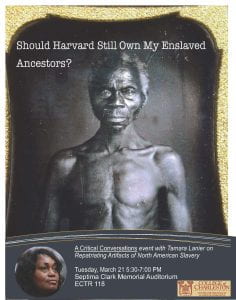Join us the for a presentation by Quattlebaum Artist Herman Ramos.
Chapel Theatre
College of Charleston
172 Calhoun Street, Charleston, SC 29401
Friday, April 14th
12:00 PM – 12:50 PM(ET)

Join us the for a presentation by Quattlebaum Artist Herman Ramos.
Chapel Theatre
College of Charleston
172 Calhoun Street, Charleston, SC 29401
Friday, April 14th
12:00 PM – 12:50 PM(ET)
Thaddeus Street Jr. Education Center
Septima P. Clark Auditorium (Rm 118)
25 St. Philip Street, Charleston, SC
Wednesday, March 22, 2023
5:00PM – 6:30 PM (ET)
Join African American Studies affiliate faculty Dr. Nakeisha Daniel and Gary Marshall of the Theatre Department in a conversation with Dr. Patricia Williams Dockery, the former director of the Avery Research Center, regarding her play, Septima. Septima, currently showing at PURE Theatre, depicted the life of Septima Clark. Explore Dockery’s process for depicting Septima Clark on the stage and the importance of her life on African American life in Charleston, South Carolina.
Thaddeus Street Jr. Education Center
Septima P. Clark Auditorium (Rm 118)
25 St. Philip Street, Charleston, SC
Tuesday, March 21, 2023
5:30PM – 7:00 PM(ET)
 The Center for the Study of Slavery in Charleston has invited Tamara Lanier to deliver a lecture about her enslaved ancesto
The Center for the Study of Slavery in Charleston has invited Tamara Lanier to deliver a lecture about her enslaved ancesto
 Stern Center Ballroom
Stern Center BallroomThursday, February 16th at 5 pm
Thaddeus Street Jr. Education Center * Septima Clark Auditorium
25 St. Philip Street, Room 118
origin story outlines a family history of distant sisters, grieving mothers and daughters, and alcoholic fathers. These poems take us from Kansas to Korea and back again in an attempt to reconnect with estranged family and familial ghosts divided by years of diaspora. An interrogation of cultural and personal myths, origin story wrestles with the questions: Who will remember us? How do we deal with the failures of memory? Whose stories are told?
Black southerners often shielded their loved ones from the most painful memories of local lynchings with strategic silences but also told lynching stories about vengeful ghosts or a wrathful God or the deathbed confessions of a lyncher tormented by his past. They protested lynching and its legacies through art and activism, and they mourned those lost to a mob’s fury. They infused a blues element into their lynching narratives to confront traumatic memories and keep the blues at bay, even if just for a spell. Telling their stories troubles the simplistic binary of resistance or submission that has tended to dominate narratives of Black life and reminds us that amid the utter devastation of lynching were glimmers of hope and an affirmation of life.
My Soul Is a Witness traces the long afterlife of lynching in the South through the traumatic memories it left in its wake. She unearths how African American victims and survivors found ways to live through and beyond the horrors of lynching, offering a theory of African American collective trauma and memory rooted in the ironic spirit of the blues sensibility—a spirit of misdirection and cunning that blends joy and pain.
Don’t forget that we’ve got the Decolonizing the Curriculum: Teaching Race Across the Disciplines series happening this academic year.
There are still 2 more events this semester!
March 24th – Black English: Understanding and Honoring Linguistic Dexterity
Click to register for the zoom event.
April 7th – Conseula Francis Emerging Scholar Lecture with Dr. Tao Leigh Goffe
Click to register for the zoom event.
 The DC Semester Program for Democracy, Culture, and the Arts (DCSP) is now accepting applications for the Fall 2022 semester! This study away program, which is run by the College of Charleston, provides students who are interested in arts and culture with an opportunity to synthesize their coursework with professional experience at Washington DC-area arts organizations. The program combines a full-time (and often paid) internship in DC (DCSP 395; 6 credits) with a seminar on democracy, culture, and the arts (DCSP 350; 3 credits). Students also take either a 3-credit independent study or a 3-credit online course at the College of Charleston. Combining an internship with coursework has the benefit of helping students build professional contacts and skills while still in school and connecting their academic interests to their professional goals after graduation. For AAST students, the opportunities for arts and culture internships in DC are bountiful—there are dozens of museums, foundations, non-profits, media companies, and government agencies with relevant internships. Also, the African American Studies Program is in the process of allowing DCSP 395 and DCSP 350 to count toward the major and minor in AAST.
The DC Semester Program for Democracy, Culture, and the Arts (DCSP) is now accepting applications for the Fall 2022 semester! This study away program, which is run by the College of Charleston, provides students who are interested in arts and culture with an opportunity to synthesize their coursework with professional experience at Washington DC-area arts organizations. The program combines a full-time (and often paid) internship in DC (DCSP 395; 6 credits) with a seminar on democracy, culture, and the arts (DCSP 350; 3 credits). Students also take either a 3-credit independent study or a 3-credit online course at the College of Charleston. Combining an internship with coursework has the benefit of helping students build professional contacts and skills while still in school and connecting their academic interests to their professional goals after graduation. For AAST students, the opportunities for arts and culture internships in DC are bountiful—there are dozens of museums, foundations, non-profits, media companies, and government agencies with relevant internships. Also, the African American Studies Program is in the process of allowing DCSP 395 and DCSP 350 to count toward the major and minor in AAST.
Students are responsible for securing an internship in DC, but the DCSP director, Professor Neufeld, and the DCSP associate director, Professor Crabtree, will assist students in identifying internships. Tuition and housing costs are billed like any other tuition and housing costs at CofC, and financial aid still applies. However, there is a program fee of around $800.
If DCSP is of interest to you, please read through the DCSP Info Sheet, which includes an application checklist and application form. If you are interested in DCSP, schedule a meeting with Professor Neufeld (neufeldja@cofc.edu) by mid-February to make sure the program is a good fit for you.
Application Deadline: March 7, 2022
Requirements: Junior or senior status at the time of the program (Fall 2022)
 We’re excited to share with everyone the Spring 2022 AAST Newsletter! Check it out to see what’s happening in the program this semester.
We’re excited to share with everyone the Spring 2022 AAST Newsletter! Check it out to see what’s happening in the program this semester.
We’re excited to share with everyone the Fall 2021 AAST Newsletter! Check it out to see what’s happening in the program this semester.
Don’t miss out on this event on September 23rd! The Dr. Conseula Francis Emerging Scholars Lecture Series presents Lelani Sabzalian, Ph.D., Assistant Professor of Indigenous Studies in Education at the University of Oregon.
This event is also the 1st in the AAST & REI Fall 2021 Virtual Lecture Series Decolonizing the Curriculum: Teaching Race Across the Disiplines!
Drawing from her book Indigenous Children’s Survivance inPublic Schools, Dr. Sabzalian’s talk highlights the everydayways that Native youth, families, and educators creativelynavigate the colonial dynamics of public education. By sharingstories of Native sovereignty and survivance, she hopes that alleducators will see themselves as responsible for counteringcolonialism and teaching in ways that better supportIndigenous students and Indigenous struggles for self-determination and sovereignty.
JOIN US ON ZOOM. REGISTRATION REQUIRED.
For more information about this series and future AfricanAmerican Studies events, follow the program on Facebook: facebook.com/AASTatCofC
To register: https://qrco.de/bcKyEV
